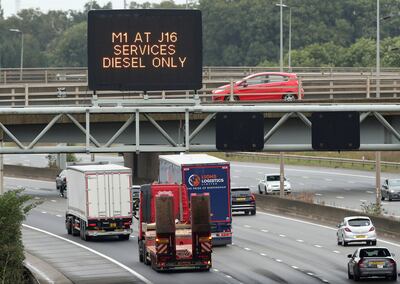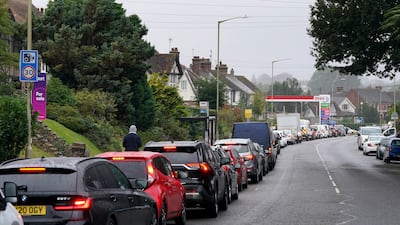A UK government minister says drivers may face another “week or so” of long queues outside petrol stations as the fuel crisis looks likely to continue.
Policing minister Kit Malthouse offered a downbeat assessment of the situation more than a week after a shortage of heavy goods vehicle drivers sparked panic-buying among motorists.
This quickly led to fuel stations running out of fuel and caused huge lines of traffic outside forecourts that still had petrol and diesel.
Mr Malthouse said there needs to be an improvement of the problems in the coming days and that Prime Minister Boris Johnson stands ready to review matters if there is any deterioration.
The minister’s comments contrasted with reassurances offered by other ministers in recent days that the crisis would dissipate as drivers resumed normal buying patterns.
The Petrol Retailers Association warned that filling stations continue to run out of fuel faster than they are resupplied, with one in four forecourts having run dry on Friday.
“We are still seeing strong demand in parts of the country around fuel. The distribution mechanism is trying to respond to this unprecedented demand,” Mr Malthouse told the BBC Radio 4 Today programme.
“My latest briefing is that the situation is stabilising, that we are seeing more forecourts with a greater supply of fuel and hopefully, as demand and supply come better into balance over the next few days, week or so, we will see a return to normality.
“I think if things start to deteriorate further, obviously the prime minister and the secretary of state for energy, whose responsibility this is, will have to review the situation.”
His comments came just 24 hours after another minister – Treasury Chief Secretary Simon Clarke – claimed the situation was “absolutely back under control”.

Earlier this week Mr Johnson ruled out granting priority access to fuel for healthcare staff on the grounds that it was unnecessary because the situation was “stabilising”.
Health chiefs argued that doctors, nurses, paramedics and other staff providing care to sick and elderly people should be allowed to jump queues at petrol stations.
Mr Malthouse said there were pockets of the country where there were still problems – with London and the South East reported to be among the hardest hit.
He said efforts were being made to balance out the situation with areas where supplies were strong, but he indicated they were being constrained by the number of tankers available.
“What we need to see is a stabilisation and improvement over the next few days,” he said.
“Obviously there only so many tankers that can be used to get this fuel around. They are trying their best to get around as fast as possible.
“There is co-ordination now across the country, looking at where there are pockets of supply problems and demand strength and trying to bring the two into balance.”
On Wednesday, Business Secretary Kwasi Kwarteng announced the government was sending out its reserve tanker fleet – driven by civilian drivers – to support the distribution efforts. The pool of 80 vehicles was brought onstream on Wednesday afternoon.
However, the government has yet to use the 150 military drivers who have been on standby since the start of the week to assist with the operation.
Mr Malthouse’s comments raise the prospect that Mr Johnson will go into the Conservatives’ annual party conference – which begins in Manchester at the weekend – with the issue still hanging over the government.
The crisis began after reports that a shortage of tanker drivers had led a number of BP stations to close, which triggered a wave of panic buying that has yet to fully subside.


